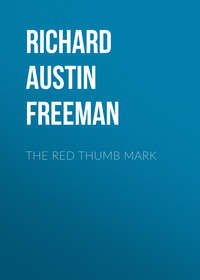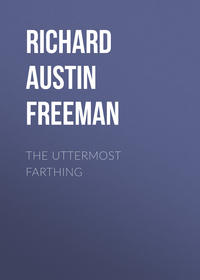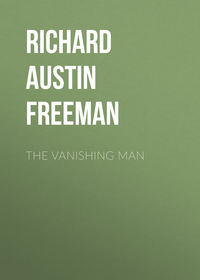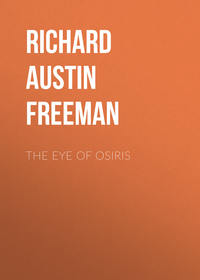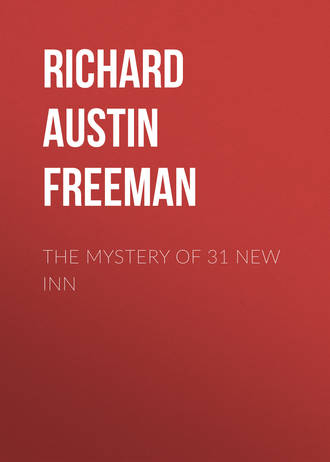 полная версия
полная версияThe Mystery of 31 New Inn
Thorndyke smiled grimly. "I should suppose," said he, "that they were indistinguishable; but the question could easily be put to the test of experiment."
"That is true," agreed Marchmont, "and it would really be worth trying, for, as you say, sparrows are more easily obtainable than larks. But, about this will. I was saying—er—now, what was I saying?"
"I understood you to say," replied Thorndyke, "that the intentions of the testator were in some way connected with mustard. Isn't that so, Jervis?"
"That was what I gathered," said I.
Marchmont gazed at us for a moment with a surprised expression and then, laughing good-humouredly, fortified himself with a draught of ale.
"The moral of which is," Thorndyke added, "that testamentary dispositions should not be mixed up with beef-steak pudding."
"I believe you're right, Thorndyke," said the unabashed solicitor. "Business is business and eating is eating. We had better talk over our case in my office or your chambers after lunch."
"Yes," said Thorndyke, "come over to the Temple with me and I will give you a cup of coffee to clear your brain. Are there any documents?"
"I have all the papers here in my bag," replied Marchmont; and the conversation—such conversation as is possible "when beards wag all" over the festive board—drifted into other channels.
As soon as the meal was finished and the reckoning paid, we trooped out of Wine Office Court, and, insinuating ourselves through the line of empty hansoms that, in those days, crawled in a continuous procession on either side of Fleet Street, betook ourselves by way of Mitre Court to King's Bench Walk. There, when the coffee had been requisitioned and our chairs drawn up around the fire, Mr. Marchmont unloaded from his bag a portentous bundle of papers, and we addressed ourselves to the business in hand.
"Now," said Marchmont, "let me repeat what I said before. Legally speaking, we have no case—not the ghost of one. But my client wished to take your opinion, and I agreed on the bare chance that you might detect some point that we had overlooked. I don't think you will, for we have gone into the case very thoroughly, but still, there is the infinitesimal chance and we may as well take it. Would you like to read the two wills, or shall I first explain the circumstances?"
"I think," replied Thorndyke, "a narrative of the events in the order of their occurrence would be most helpful. I should like to know as much as possible about the testator before I examine the documents."
"Very well," said Marchmont. "Then I will begin with a recital of the circumstances, which, briefly stated, are these: My client, Stephen Blackmore, is the son of Mr. Edward Blackmore, deceased. Edward Blackmore had two brothers who survived him, John, the elder, and Jeffrey, the younger. Jeffrey is the testator in this case.
"Some two years ago, Jeffrey Blackmore executed a will by which he made his nephew Stephen his executor and sole legatee; and a few months later he added a codicil giving two hundred and fifty pounds to his brother John."
"What was the value of the estate?" Thorndyke asked.
"About three thousand five hundred pounds, all invested in Consols. The testator had a pension from the Foreign Office, on which he lived, leaving his capital untouched. Soon after having made his will, he left the rooms in Jermyn Street, where he had lived for some years, stored his furniture and went to Florence. From thence he moved on to Rome and then to Venice and other places in Italy, and so continued to travel about until the end of last September, when it appears that he returned to England, for at the beginning of October he took a set of chambers in New Inn, which he furnished with some of the things from his old rooms. As far as we can make out, he never communicated with any of his friends, excepting his brother, and the fact of his being in residence at New Inn or of his being in England at all became known to them only when he died."
"Was this quite in accordance with his ordinary habits?" Thorndyke asked.
"I should say not quite," Blackmore answered. "My uncle was a studious, solitary man, but he was not formerly a recluse. He was not much of a correspondent but he kept up some sort of communication with his friends. He used, for instance, to write to me sometimes, and, when I came down from Cambridge for the vacations, he had me to stay with him at his rooms."
"Is there anything known that accounts for the change in his habits?"
"Yes, there is," replied Marchmont. "We shall come to that presently. To proceed with the narrative: On the fifteenth of last March he was found dead in his chambers, and a more recent will was then discovered, dated the twelfth of November of last year. Now no change had taken place in the circumstances of the testator to account for the new will, nor was there any appreciable alteration in the disposition of the property. As far as we can make out, the new will was drawn with the idea of stating the intentions of the testator with greater exactness and for the sake of doing away with the codicil. The entire property, with the exception of two hundred and fifty pounds, was, as before, bequeathed to Stephen, but the separate items were specified, and the testator's brother, John Blackmore, was named as the executor and residuary legatee."
"I see," said Thorndyke. "So that your client's interest in the will would appear to be practically unaffected by the change."
"Yes. There it is," exclaimed the lawyer, slapping the table to add emphasis to his words. "That is the pity of it! If people who have no knowledge of law would only refrain from tinkering at their wills, what a world of trouble would be saved!"
"Oh, come!" said Thorndyke. "It is not for a lawyer to say that."
"No, I suppose not," Marchmont agreed. "Only, you see, we like the muddle to be made by the other side. But, in this case, the muddle is on our side. The change, as you say, seems to leave our friend Stephen's interests unaffected. That is, of course, what poor Jeffrey Blackmore thought. But he was mistaken. The effect of the change is absolutely disastrous."
"Indeed!"
"Yes. As I have said, no alteration in the testator's circumstances had taken place at the time the new will was executed. But only two days before his death, his sister, Mrs. Edmund Wilson, died; and on her will being proved it appeared that she had bequeathed to him her entire personalty, estimated at about thirty thousand pounds."
"Heigho!" exclaimed Thorndyke. "What an unfortunate affair!"
"You are right," said Mr. Marchmont; "it was a disaster. By the original will this great sum would have accrued to our friend Mr. Stephen, whereas now, of course, it goes to the residuary legatee, Mr. John Blackmore. And what makes it even more exasperating is the fact that this is obviously not in accordance with the wishes and intentions of Mr. Jeffrey, who clearly desired his nephew to inherit his property."
"Yes," said Thorndyke; "I think you are justified in assuming that. But do you know whether Mr. Jeffrey was aware of his sister's intentions?"
"We think not. Her will was executed as recently as the third of September last, and it seems that there had been no communication between her and Mr. Jeffrey since that date. Besides, if you consider Mr. Jeffrey's actions, you will see that they suggest no knowledge or expectation of this very important bequest. A man does not make elaborate dispositions in regard to three thousand pounds and then leave a sum of thirty thousand to be disposed of casually as the residue of the estate."
"No," Thorndyke agreed. "And, as you have said, the manifest intention of the testator was to leave the bulk of his property to Mr. Stephen. So we may take it as virtually certain that Mr. Jeffrey had no knowledge of the fact that he was a beneficiary under his sister's will."
"Yes," said Mr. Marchmont, "I think we may take that as nearly certain."
"With reference to the second will," said Thorndyke, "I suppose there is no need to ask whether the document itself has been examined; I mean as to its being a genuine document and perfectly regular?"
Mr. Marchmont shook his head sadly.
"No," he said, "I am sorry to say that there can be no possible doubt as to the authenticity and regularity of the document. The circumstances under which it was executed establish its genuineness beyond any question."
"What were those circumstances?" Thorndyke asked.
"They were these: On the morning of the twelfth of November last, Mr. Jeffrey came to the porter's lodge with a document in his hand. 'This,' he said, 'is my will. I want you to witness my signature. Would you mind doing so, and can you find another respectable person to act as the second witness?' Now it happened that a nephew of the porter's, a painter by trade, was at work in the Inn. The porter went out and fetched him into the lodge and the two men agreed to witness the signature. 'You had better read the will,' said Mr. Jeffrey. 'It is not actually necessary, but it is an additional safeguard and there is nothing of a private nature in the document.' The two men accordingly read the document, and, when Mr. Jeffrey had signed it in their presence, they affixed their signatures; and I may add that the painter left the recognizable impressions of three greasy fingers."
"And these witnesses have been examined?"
"Yes. They have both sworn to the document and to their own signatures, and the painter recognized his finger-marks."
"That," said Thorndyke, "seems to dispose pretty effectually of any question as to the genuineness of the will; and if, as I gather, Mr. Jeffrey came to the lodge alone, the question of undue influence is disposed of too."
"Yes," said Mr. Marchmont. "I think we must pass the will as absolutely flawless."
"It strikes me as rather odd," said Thorndyke, "that Jeffrey should have known so little about his sister's intentions. Can you explain it, Mr. Blackmore?"
"I don't think that it is very remarkable," Stephen replied. "I knew very little of my aunt's affairs and I don't think my uncle Jeffrey knew much more, for he was under the impression that she had only a life interest in her husband's property. And he may have been right. It is not clear what money this was that she left to my uncle. She was a very taciturn woman and made few confidences to anyone."
"So that it is possible," said Thorndyke, "that she, herself, may have acquired this money recently by some bequest?"
"It is quite possible," Stephen answered.
"She died, I understand," said Thorndyke, glancing at the notes that he had jotted down, "two days before Mr. Jeffrey. What date would that be?"
"Jeffrey died on the fourteenth of March," said Marchmont.
"So that Mrs. Wilson died on the twelfth of March?"
"That is so," Marchmont replied; and Thorndyke then asked:
"Did she die suddenly?"
"No," replied Stephen; "she died of cancer. I understand that it was cancer of the stomach."
"Do you happen to know," Thorndyke asked, "what sort of relations existed between Jeffrey and his brother John?"
"At one time," said Stephen, "I know they were not very cordial; but the breach may have been made up later, though I don't know that it actually was."
"I ask the question," said Thorndyke, "because, as I dare say you have noticed, there is, in the first will, some hint of improved relations. As it was originally drawn that will makes Mr. Stephen the sole legatee. Then, a little later, a codicil is added in favour of John, showing that Jeffrey had felt the necessity of making some recognition of his brother. This seems to point to some change in the relations, and the question arises: if such a change did actually occur, was it the beginning of a new and further improving state of feeling between the two brothers? Have you any facts bearing on that question?"
Marchmont pursed up his lips with the air of a man considering an unwelcome suggestion, and, after a few moments of reflection, answered:
"I think we must say 'yes' to that. There is the undeniable fact that, of all Jeffrey's friends, John Blackmore was the only one who knew that he was living in New Inn."
"Oh, John knew that, did he?"
"Yes, he certainly did; for it came out in the evidence that he had called on Jeffrey at his chambers more than once. There is no denying that. But, mark you!" Mr. Marchmont added emphatically, "that does not cover the inconsistency of the will. There is nothing in the second will to suggest that Jeffrey intended materially to increase the bequest to his brother."
"I quite agree with you, Marchmont. I think that is a perfectly sound position. You have, I suppose, fully considered the question as to whether it would be possible to set aside the second will on the ground that it fails to carry out the evident wishes and intentions of the testator?"
"Yes. My partner, Winwood, and I went into that question very carefully, and we also took counsel's opinion—Sir Horace Barnaby—and he was of the same opinion as ourselves; that the court would certainly uphold the will."
"I think that would be my own view," said Thorndyke, "especially after what you have told me. Do I understand that John Blackmore was the only person who knew that Jeffrey was in residence at New Inn?"
"The only one of his private friends. His bankers knew and so did the officials from whom he drew his pension."
"Of course he would have to notify his bankers of his change of address."
"Yes, of course. And à propos of the bank, I may mention that the manager tells me that, of late, they had noticed a slight change in the character of Jeffrey's signature—I think you will see the reason of the change when you hear the rest of his story. It was very trifling; not more than commonly occurs when a man begins to grow old, especially if there is some failure of eyesight."
"Was Mr. Jeffrey's eyesight failing?" asked Thorndyke.
"Yes, it was, undoubtedly," said Stephen. "He was practically blind in one eye and, in the very last letter that I ever had from him, he mentioned that there were signs of commencing cataract in the other."
"You spoke of his pension. He continued to draw that regularly?"
"Yes; he drew his allowance every month, or rather, his bankers drew it for him. They had been accustomed to do so when he was abroad, and the authorities seem to have allowed the practice to continue."
Thorndyke reflected a while, running his eye over the notes on the slips of paper in his hand, and Marchmont surveyed him with a malicious smile. Presently the latter remarked:
"Methinks the learned counsel is floored."
Thorndyke laughed. "It seems to me," he retorted, "that your proceedings are rather like those of the amiable individual who offered the bear a flint pebble, that he might crack it and extract the kernel. Your confounded will seems to offer no soft spot on which one could commence an attack. But we won't give up. We seem to have sucked the will dry. Let us now have a few facts respecting the parties concerned in it; and, as Jeffrey is the central figure, let us begin with him and the tragedy at New Inn that formed the starting-point of all this trouble."
Chapter VI
Jeffrey Blackmore, DeceasedHaving made the above proposition, Thorndyke placed a fresh slip of paper on the blotting pad on his knee and looked inquiringly at Mr. Marchmont; who, in his turn, sighed and looked at the bundle of documents on the table.
"What do you want to know?" he asked a little wearily.
"Everything," replied Thorndyke. "You have hinted at circumstances that would account for a change in Jeffrey's habits and that would explain an alteration in the character of his signature. Let us have those circumstances. And, if I might venture on a suggestion, it would be that we take the events in the order in which they occurred or in which they became known."
"That's the worst of you, Thorndyke," Marchmont grumbled. "When a case has been squeezed out to the last drop, in a legal sense, you want to begin all over again with the family history of every one concerned and a list of his effects and household furniture. But I suppose you will have to be humoured; and I imagine that the best way in which to give you the information you want will be to recite the circumstances surrounding the death of Jeffrey Blackmore. Will that suit you?"
"Perfectly," replied Thorndyke; and thereupon Marchmont began:
"The death of Jeffrey Blackmore was discovered at about eleven o'clock in the morning of the fifteenth of March. It seems that a builder's man was ascending a ladder to examine a gutter on number 31, New Inn, when, on passing a second-floor window that was open at the top, he looked in and perceived a gentleman lying on a bed. The gentleman was fully clothed and had apparently lain down on the bed to rest; at least so the builder thought at the time, for he was merely passing the window on his way up, and, very properly, did not make a minute examination. But when, some ten minutes later, he came down and saw that the gentleman was still in the same position, he looked at him more attentively; and this is what he noticed—but perhaps we had better have it in his own words as he told the story at the inquest.
"'When I came to look at the gentleman a bit more closely, it struck me that he looked rather queer. His face looked very white, or rather pale yellow, like parchment, and his mouth was open. He did not seem to be breathing. On the bed by his side was a brass object of some kind—I could not make out what it was—and he seemed to be holding some small metal object in his hand. I thought it rather a queer affair, so, when I came down I went across to the lodge and told the porter about it. The porter came out across the square with me and I showed him the window. Then he told me to go up the stairs to Mr. Blackmore's chambers on the second pair and knock and keep on knocking until I got an answer. I went up and knocked and kept on knocking as loud as I could, but, though I fetched everybody out of all the other chambers in the house, I couldn't get any answer from Mr. Blackmore. So I went downstairs again and then Mr. Walker, the porter, sent me for a policeman.
"'I went out and met a policeman just by Dane's Inn and told him about the affair, and he came back with me. He and the porter consulted together, and then they told me to go up the ladder and get in at the window and open the door of the chambers from the inside. So I went up; and as soon as I got in at the window I saw that the gentleman was dead. I went through the other room and opened the outer door and let in the porter and the policeman.'
"That," said Mr. Marchmont, laying down the paper containing the depositions, "is the way in which poor Jeffrey Blackmore's death came to be discovered.
"The constable reported to his inspector and the inspector sent for the divisional surgeon, whom he accompanied to New Inn. I need not go into the evidence given by the police officers, as the surgeon saw all that they saw and his statement covers everything that is known about Jeffrey's death. This is what he says, after describing how he was sent for and arrived at the Inn:
"'In the bedroom I found the body of a man between fifty and sixty years of age, which has since been identified in my presence as that of Mr. Jeffrey Blackmore. It was fully dressed and wore boots on which was a moderate amount of dry mud. It was lying on its back on the bed, which did not appear to have been slept in, and showed no sign of any struggle or disturbance. The right hand loosely grasped a hypodermic syringe containing a few drops of clear liquid which I have since analysed and found to be a concentrated solution of strophanthin.
"'On the bed, close to the left side of the body, was a brass opium-pipe of a pattern which I believe is made in China. The bowl of the pipe contained a small quantity of charcoal, and a fragment of opium together with some ash, and there was on the bed a little ash which appeared to have dropped from the bowl when the pipe fell or was laid down. On the mantelshelf in the bedroom I found a small glass-stoppered jar containing about an ounce of solid opium, and another, larger jar containing wood charcoal broken up into small fragments. Also a bowl containing a quantity of ash with fragments of half-burned charcoal and a few minute particles of charred opium. By the side of the bowl were a knife, a kind of awl or pricker and a very small pair of tongs, which I believe to have been used for carrying a piece of lighted charcoal to the pipe.
"'On the dressing-table were two glass tubes labelled "Hypodermic Tabloids: Strophanthin 1/500 grain," and a minute glass mortar and pestle, of which the former contained a few crystals which have since been analysed by me and found to be strophanthin.
"'On examining the body, I found that it had been dead about twelve hours. There were no marks of violence or any abnormal condition excepting a single puncture in the right thigh, apparently made by the needle of the hypodermic syringe. The puncture was deep and vertical in direction as if the needle had been driven in through the clothing.
"'I made a post-mortem examination of the body and found that death was due to poisoning by strophanthin, which appeared to have been injected into the thigh. The two tubes which I found on the dressing-table would each have contained, if full, twenty tabloids, each tabloid representing one five-hundredth of a grain of strophanthin. Assuming that the whole of this quantity was injected the amount taken would be forty five-hundredths, or about one twelfth of a grain. The ordinary medicinal dose of strophanthin is one five-hundredth of a grain.
"'I also found in the body appreciable traces of morphine—the principal alkaloid of opium—from which I infer that the deceased was a confirmed opium-smoker. This inference was supported by the general condition of the body, which was ill-nourished and emaciated and presented all the appearances usually met with in the bodies of persons addicted to the habitual use of opium.'
"That is the evidence of the surgeon. He was recalled later, as we shall see, but, meanwhile, I think you will agree with me that the facts testified to by him fully account, not only for the change in Jeffrey's habits—his solitary and secretive mode of life—but also for the alteration in his handwriting."
"Yes," agreed Thorndyke, "that seems to be so. By the way, what did the change in the handwriting amount to?"
"Very little," replied Marchmont. "It was hardly perceptible. Just a slight loss of firmness and distinctness; such a trifling change as you would expect to find in the handwriting of a man who had taken to drink or drugs, or anything that might impair the steadiness of his hand. I should not have noticed it, myself, but, of course, the people at the bank are experts, constantly scrutinizing signatures and scrutinizing them with a very critical eye."
"Is there any other evidence that bears on the case?" Thorndyke asked.
Marchmont turned over the bundle of papers and smiled grimly.
"My dear Thorndyke," he said, "none of this evidence has the slightest bearing on the case. It is all perfectly irrelevant as far as the will is concerned. But I know your little peculiarities and I am indulging you, as you see, to the top of your bent. The next evidence is that of the chief porter, a very worthy and intelligent man named Walker. This is what he says, after the usual preliminaries.
"'I have viewed the body which forms the subject of this inquiry. It is that of Mr. Jeffrey Blackmore, the tenant of a set of chambers on the second floor of number thirty-one, New Inn. I have known the deceased nearly six months, and during that time have seen and conversed with him frequently. He took the chambers on the second of last October and came into residence at once. Tenants at New Inn have to furnish two references. The references that the deceased gave were his bankers and his brother, Mr. John Blackmore. I may say that the deceased was very well known to me. He was a quiet, pleasant-mannered gentleman, and it was his habit to drop in occasionally at the lodge and have a chat with me. I went into his chambers with him once or twice on some small matters of business and I noticed that there were always a number of books and papers on the table. I understood from him that he spent most of his time indoors engaged in study and writing. I know very little about his way of living. He had no laundress to look after his rooms, so I suppose he did his own house-work and cooking; but he told me that he took most of his meals outside, at restaurants or his club.


